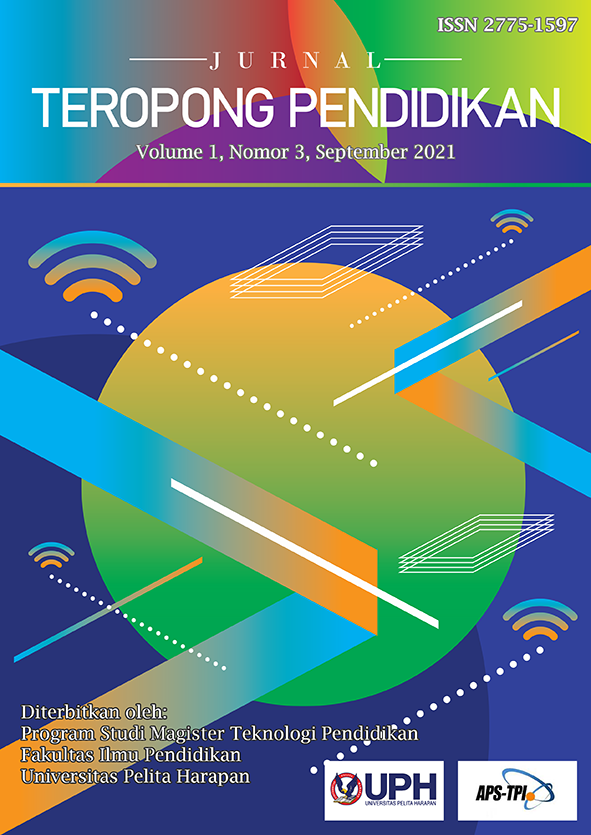Meningkatkan Keterampilan Komunikasi, Sikap Kerja Sama dan Penguasaan Konsep Siswa Melalui Implementasi Pembelajaran Inkuiri [Enhancing Communication Skill, Teamwork, and Student’s Mastery Concept Through the Implementation of Inquiry Learning]
DOI:
https://doi.org/10.19166/jtp.v1i3.4203Λέξεις-κλειδιά:
Inquiry Learning Model, Communication Skill, Teamwork, Student’s Mastery ConceptΠερίληψη
Communication skills, cooperative attitude and mastery of concepts are very important for students to have. This research aims to know the increasing of communication skills, teamwork and student's mastery concept through inquiry learning model. This research was carried out using a quantitative approach through the experimental method of one group pre-test post-test. Data were obtained through 34 students in one class. The results showed that there were differences in communication skills, cooperative attitudes and mastery of students' concepts from before and after the implementation of inquiry learning, which was known from the increase in average scores and N-gain.
Αναφορές
Arends, R. I. (2008). Learning to teach: Belajar untuk mengajar (7th ed.). Pustaka Pelajar.
Baedowi, A. (2015). Manajemen sekolah efektif. Pustaka Alvabet.
Beyer, B. K. (1971). Inquiry in the social studies classroom: A strategy for teaching. Merrill Publishing Company.
Biro Komunikasi Dan Pelayanan Informasi Kementerian Keuangan RI Sekretariat Jenderal. (2013). Komunikasi yang efektif: Kumpulan penelitian komunikasi III/2013. Kementerian Keuangan.
Dahlan, H. (2012, January 29). Pengertian kerja sama. Diamond. http://hendriansdiamond.blogspot.com/2012/01/pengetian-kerjasama.html
Fraenkel, J. R., Wallen, N. E., & Hyun, H. H. (2012). How to design and evaluate research in education. McGraw-Hill.
Furchan, H. A. (2007). Pengantar penelitian dalam pendidikan. Pustaka Pelajar.
Gulo, W. (2002). Strategi belajar mengajar. PT Grasindo.
Hardjana, A. M. (2003). Komunikasi intrapersonal & komunikasi interpesonal. Kanisius.
Helperida, & Timawati. (2012, September 6). Problem-based learning (Pembelajaran berbasis masalah). http://kekeislearning.blogspot.co.id/2012/09/problem-based-learning.html
Hurlock, E. B. (1978). Perkembangan anak. Penerbit Erlangga.
Ismainar, H. (2015). Manajemen unit kerja: Untuk perekam medis dan informatika kesehatan ilmu kesehatan keperawatan dan kebidanan. CV Budi Utama.
Murdoch, K. (1998). Classroom connections: Strategies for integrated learning. Eleanor Curtain Publishing.
Mutmainah, N., & Fauzi. (1997). Psikologi komunikasi. Universitas Terbuka.
Rahayu, A. Y. (2013). Anak usia TK: Menumbuhkan kepercayaan diri melalui kegiatan bercerita. Indeks.
Rahmawati, M. C. (2015). Penerapan model pembelajaran inkuiri 5E dengan pengintegrasian pendekatan saintifik dan lingkungan untuk meningkatkan hasil belajar IPA SD. Universitas Pelita Harapan.
Rakhmat, J. (2005). Psikologi komunikasi. Remaja Rosdakarya.
Rulyanda, Dodi. (2014, August 17). Hakikat dan tujuan pembelajaran di SD. Blogspot. https://dodirullyandapgsd.blogspot.com/2014/08/hakikat-dan-tujuan-pembelajaran-ipa.html
Somasundaram, V. (2005). Priciple of communication. Authorspress.
Sugiyono. (2015). Metode penelitian pendidikan: Pendekatan kuantitatif, kualitatif, dan R & D. Alfabeta.
Tiarani, V. A. (2002). Pembelajaran IPA di sekolah dasar. Staff Site Universitas Negeri Yogyakarta. http://staff.uny.ac.id/sites/deafult/files/tmp/PEMBELAJARAN%20IPA%20di%20SEKOLAH%20DASAR.pdf
Tim Pengembang Ilmu Pendidikan. (2007). Ilmu & Aplikasi Pendidikan. Imperial Bhakti Utama.
Timawati. (2012, September 6). Penguasaan Konsep. Blogspot. http://kekeislearning.blogspot.co.id/2012/09/penguasaan-konsep.html
Widi, H. (2014, July 12). Penguasaan Konsep. Blogspot. http://bocahlatar.blogspot.co.id/2014/07/pengertian-penguasaan-konsep.html
Λήψεις
Δημοσιευμένα
Τεύχος
Ενότητα
Άδεια
Authors who publish with this journal agree to the following terms:
1) Authors retain copyright and grant the journal right of first publication with the work simultaneously licensed under a Creative Commons Attribution License (CC-BY-SA 4.0) that allows others to share the work with an acknowledgement of the work's authorship and initial publication in this journal.
2) Authors are able to enter into separate, additional contractual arrangements for the non-exclusive distribution of the journal's published version of the work (e.g., post it to an institutional repository or publish it in a book), with an acknowledgement of its initial publication in this journal.
3) Authors are permitted and encouraged to post their work online (e.g., in institutional repositories or on their website). The final published PDF should be used and bibliographic details that credit the publication in this journal should be included.





